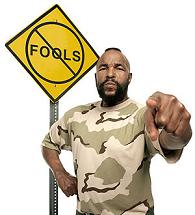 Readers of Entertainment Weekly’s cover story on Battlestar Galactica’s third season premiere probably weren’t shocked to read that this year’s series would be colored with shades of occupied Iraq. President Gaius Baltar’s surrrender of New Caprica to the Cylons and collaboration with the man-made robots set up the perfect lead-in to a modern morality tale, reflecting not only current events in the Middle East, but Nazi Germany and Serbia as well.
Readers of Entertainment Weekly’s cover story on Battlestar Galactica’s third season premiere probably weren’t shocked to read that this year’s series would be colored with shades of occupied Iraq. President Gaius Baltar’s surrrender of New Caprica to the Cylons and collaboration with the man-made robots set up the perfect lead-in to a modern morality tale, reflecting not only current events in the Middle East, but Nazi Germany and Serbia as well.
Science fiction shows have always tackled important topics of the day, cloaked in the safety of events occurring in a galaxy far, far away. “Star Trek” tackled racism in one of its most famous episodes–featuring the Cherons with faces that were half black and half white–and even showed the first interracial kiss on television. But “Battlestar Galactica” is moving light years beyond other shows–such as “Doctor Who,” with it’s wink to fictional “Mass Weapons of Destruction”–by creating confrontational, and at times uncomfortable, viewing.
Horace Newcomb, director of the Peabody Awards, told E!Online, when Battlestar Galactica won that award, that “it treats contemporary issues from an angle that really make you think about those issues… issues of race, gender, all those things are dealt with in that context.”
Having found an inhabitable planet, the newly elected President Baltar leads most of the remaining human race down to settle New Caprica. However, Captain Adama and much of the fleet remain abord ship, circling the planet for fear of a Cylon attack. For one year, all is peaceful, and then the Cylons appear, wrangling the humans on the planet into shanty towns and zones, creating an occupied New Caprica. The fleet, ill-prepared after a year of lazing around, and having lost much of its crew, retreats in order to regroup and retrain those still aboard.
The season opener features scenes of prisoners being kept in Guantanamo-like conditions, intimations of horrific tortures, random detentions, mass executions, and secret police made up of humans working with the Cylons. The human resistance retaliates with a coordinated series of suicide bombings–a practice most viewers find abhorrent, having seen casualty counts rising from these type attacks on the evening news. But, these are the “good guys” carrying out the attacks; the type of underhanded attacks politicians and pundits ascribe to cowards.
As a whole, the Cylons remain unambiguously the “bad guys,” with the marvelously malevolent Dean Stockwell Brother Cavil forcing Baltar to sign an order of mass execution for anyone suspected of helping the underground. The picture being painted is not subtle, and the strokes are broad–no more so than 2005’s FX cinema verite-shot Iraq War drama “Over There,” but again, this is all taking place in a galaxy far, far, away.


